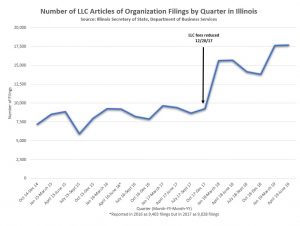Lower fees and create opportunities
To encourage new business creation and ease burdens on existing businesses, cities should lower fees.

Studies show that most Americans don’t have the savings to cover a surprise $500 expense. Yet even as the pandemic rages on, many cities expect entrepreneurs to shell out hundreds—or even thousands—of dollars in fees to start their businesses. These fees act as cost barriers to low- and middle-income entrepreneurs, making it more difficult for them to earn an honest living in tough economic times.
The problem
Business owners typically need permission from several city departments before they reach opening day. Each interaction comes with its own set of costs—from getting a business license to navigating zoning, from sign-permit applications to filing articles of incorporation. Even lower-impact business models, like non-food retail stores or temporary pop-ups, often must pay several hundreds of dollars in fees for general license requirements.
In IJ’s surveys on barriers to starting up, entrepreneurs consistently cite high fees as one of the major obstacles to opening a business in their cities.
Local solutions
Cities across the country have explored ways to ease costs on new businesses:
- Seattle accommodates smaller businesses by phasing license fees according to the business’s annual revenue.
- Boston charges a low $65 fee for its general business certificate.
State governments have also recognized the need for fee reform. In 2017, Illinois cut corporate-registration fees for LLCs from $500 to $150; the state saw a 62% increase in registrations the following quarter.
Strategies for reform
Money spent on licensure and regulatory compliance is money not invested in the business itself. Here are strategies your city can pursue to ensure that all residents have the opportunity to be their own boss:
- Ensure all fees match enforcement costs—catalogue all registration fees and cut those that are arbitrarily or unnecessarily high.
- Lower costs for new or small businesses by basing fees on annual revenue or the types of reviews or inspections required for the business type. Consider fee grace periods so that those just getting started can earn income before paying government fees.
- Reduce late fees that punish entrepreneurs for honest mistakes under complex rules.
Let’s get to work in your city.
Please fill out this form and an IJ staff member will reach out to you shortly.

